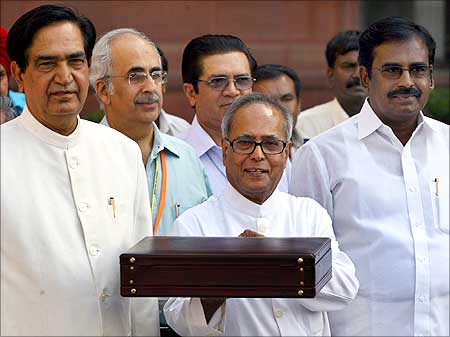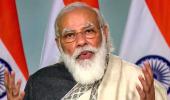The sad truth is that the debt-to-GDP ratio will shoot up close to 90 per cent in the coming year, and the fiscal deficit glide path does not promise to reduce it substantially any time soon, observes Mihir S Sharma.

The weeks that have passed since the Union Budget have led to an interesting shift in political discourse about the economy.
The government is now being portrayed as bravely reformist. To what extent should this rhetorical adjustment give us hope for a new era of reforms?
The first and important point to note is that there is much in the fine print of the Budget that is, indeed, worth celebrating and a step forward.
The promise of a roadmap for privatisation of non-'essential' public sector units is, in spite of the serial disinvestment failures of the past years, a major step forward.
The government has after all now committed in Parliament to a path of privatisation, and can be held to account.
The virtues of honesty and transparency are also being earned. In spite of the fact that this Budget was forced to declare a fiscal deficit for the ongoing year of 9.5 per cent of gross domestic product, and also that the future path of the fiscal deficit would be extremely gentle -- giving it six years to reach 4.5 per cent of GDP, not even the legally mandated target of 3 per cent -- it has, nevertheless, not spooked the bond markets.
We can debate about why this is the case. There is a negative reason, namely that it has instructed the Reserve Bank of India to ensure through direct and indirect purchases that yields do not go out of control.
This is another reminder that the RBI should no longer serve as the debt management office of the government, since that forces it to identify itself too closely with the goals and aims of fiscal policy.
But there is a positive reason too. For the first time since before the last financial crisis, the numbers in the Budget can be seen as being broadly trustworthy.
Not all off-Budget borrowing and contingent liabilities have been included in the fiscal deficit numbers, but just bringing the Food Corporation of India above the line is a sufficiently big step forward towards normalcy as to wipe out many past sins when it comes to data obfuscation.
Markets and ratings agencies have thus held off from excessively stringent criticism of the magnitude of the government borrowing programme, reasoning that at least we know now approximately what size it will be.
Others have praised the government -- and, indeed, it has praised itself -- for its decision on how to spend much of this extra borrowing.
The government has doubled down on its decision to prioritise capital formation by the public sector.
Now the fact is that this strategy has not so far paid off for the government, in spite of it having been in every Budget for the past few years.
Private sector investment remains subdued. The fact is that reality is bearing out basic economic theory: Public spending and deficits are crowding out private investment.
The government's own fresh answer to the problem of private investment may not work out, but is at least worth trying.
It is relying on, first, a revival in the banking sector with the construction of a bad bank; second, incentivising private capital flows into frontier sectors and infrastructure through regulatory changes and the creation of a new blended finance development institution; and third, through 'asset monetisation' of existing State resources.
All these strategies are risky and painfully dependent on how they are implemented -- which is not this bureaucrat-dominated government's strong suit.
A bad bank will run up against the same concerns about haircuts that have prevented state-run banks from solving the non-performing asset problem for themselves.
A development finance institution is a much better idea, one worth trying -- indeed, one that this writer has argued for on several occasions.
But if it becomes subject to bureaucratic capture and the Central Vigilance Commission/Central Information Commission/Central Bureau of Investigation complex -- in other words, if it is less than completely professional -- it will not work as hoped either.
And finally, asset monetisation is a short-cut around real privatisation, and as a mechanism for infrastructure finance depends too greatly on good sense in the government as well as on politicians, avoiding the temptation to build white elephants like high-speed rail.
The nature of the government's big bet is thus making itself clear. It hopes to gain a few years' grace from the capital markets and ratings agencies, during which it will borrow frantically to fund infrastructure.
It hopes that this infrastructure will thus, in turn, lead to enhanced private sector investment, funded by freed-up domestic capital or new international fund flows.
Growth will then return to the economy, which will swell the denominator of the debt-to-GDP ratio, and send it back downwards towards reasonable levels.
For the sad truth is that the debt-to-GDP ratio will shoot up close to 90 per cent in the coming year, and the fiscal deficit glide path does not promise to reduce it substantially any time soon.
A recent report from the Institute of International Finance argues that 'wider deficits than originally planned' can be managed in that they will retain stability in the debt-to-GDP ratio -- it won't explode, but it won't come down to recent manageable levels, either.
But such a high, Latin American, level of debt-to-GDP will, it points out, allows 'for barely any manoeuvre room under future shocks'.
In other words, we had better pray that no 'taper tantrum' hits us any time soon, the way it did in 2013 after Pranab Mukherjee's failure to manage the deficit in the early 2010s.
If the government's bet pays off, this will be remembered as a visionary Budget, comparable to the best of its predecessors.
If the bet does not, then I fear this Budget will be put in a bucket with Pranab Mukherjee's worst endeavours, as destabilising the macro-economy sufficiently to expose India to threats of a crisis.
Let's hope for India's sake the bet works out.
Feature Presentation: Rajesh Alva/Rediff.com












 © 2025
© 2025